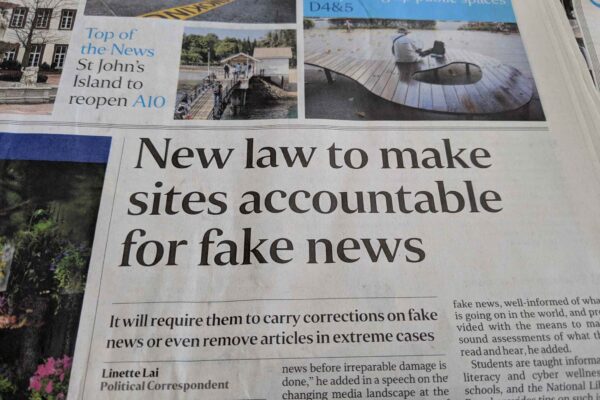
Singapore is set to introduce a new law on fake news. I’m sitting on the fence with this one. While fake news are at the least annoying, if not a valid societal problem, I’m also concerned about how this will play out in Singapore. Who decides what news is fake?
The Protection from Online Falsehoods and Manipulation Bill was introduced in parliament today. The intent is to give the government power to compel online news sites to show corrections or display warnings about online falsehoods so that readers or viewers can see all sides and make up their on minds about the matter. The government can also compel online news sites to remove the fake news.

This matter of online falsehood is a problem that the governments of several other countries are trying to grapple with. There is certainly a lot of legitimate need for such a bill. In Singapore, however, cynical citizens are no doubt wondering how it might be possible for such a bill to become a tool for censorship and suppression of alternative views.
The government has make an example of its dispute with Facebook last year to underscore the need for their fake news law. Will the government let Facebook air their side of the story? If government felt they were defamed by Facebook, what other action have they taken?
Who decides what news is fake? Does the government want a free pass to decide what is fake news?
I do agree that online falsehood is a problem. I don’t have a perfect solution. My thoughts revolve around education, strengthening social cohesion. It might not be enough, and like I said at the start, I’m sitting on the fence with this fake news law. The legislation must be careful to not let the government overstep its powers.
It is also, in fact, to the government’s benefit to be see that fake news is dealt in a fair and transparent manner. They must make sure that they aren’t trying to impose their point of view on everyone. It’s almost impossible to censor the Internet.
Any attempt to do so will simply drive users to other platforms, platforms that are harder to control, harder to monitor. Falsehoods out in the open can be monitored, and they can be addressed. If everything is driven to an anonymous dark web platform, we’ll not only have not fixed anything, but made the problem even more difficult.
The government should also realise that the days of local mainstream media being the primary source of news is practically over. We receive news from varied sources. The more you want us to think the Straits Times or Channel News Asia is impartial, the more we think they aren’t.
In fact, I sympathise with journalists who aspire to give us balanced and accurate news and editorials. Their valiant efforts are diminished by the blessings that the government bestows on our local mainstream media. The more the government tells us that the Straits Time sand Channel News Asia are right the media to consume, the more I worry about some hidden agenda.
These days, I turn to the Straits Times and Channel News Asia to get the “official government version” of a story. Then, I turn to numerous other online news sources, some of them no doubt also reputable, to get an alternate version. This is what a discerning reader should do.
If you need or depend on an authority to tell you what is the right news to read, then you’re not very good at handling yourself on the Internet.
The fake news law might also introduce unwanted side effects. For example, the moment the government tries to declare something as fake news, we can be quite certain that a lot more interest will be created on that fake news, perhaps helping it to spread even faster. This is the so-called Streisand effect.
We’ve got to tread carefully on this one. We can have a law that creates a better society for us. But it can also be abused, or have undesirable consequences.
View Comment Policy